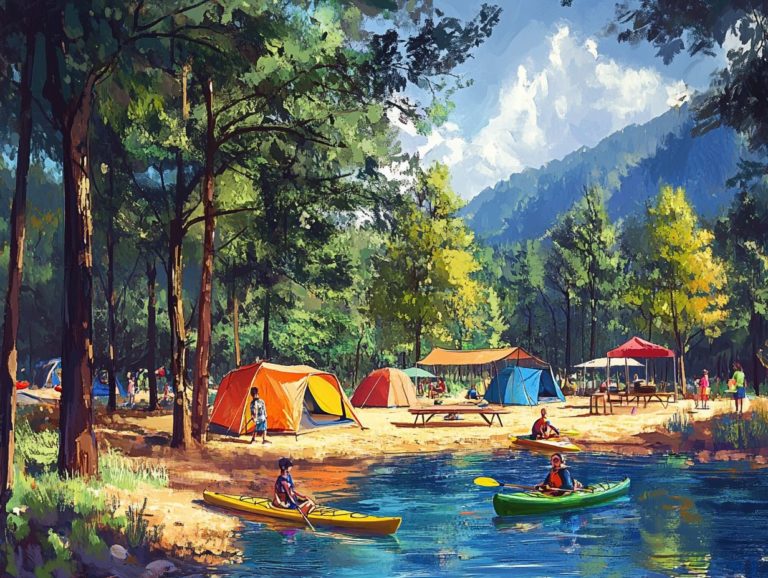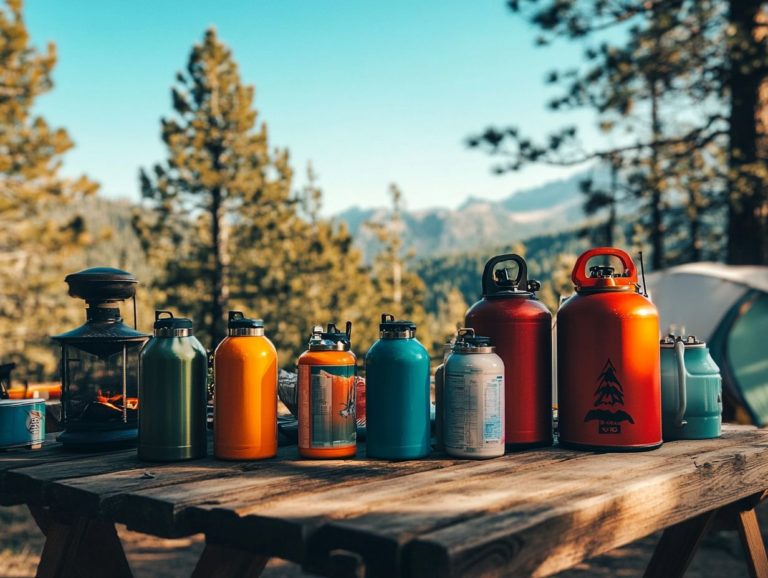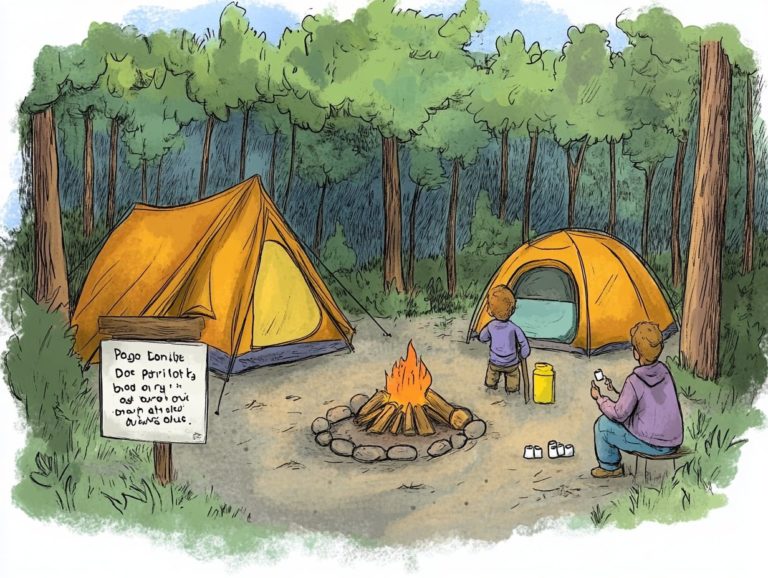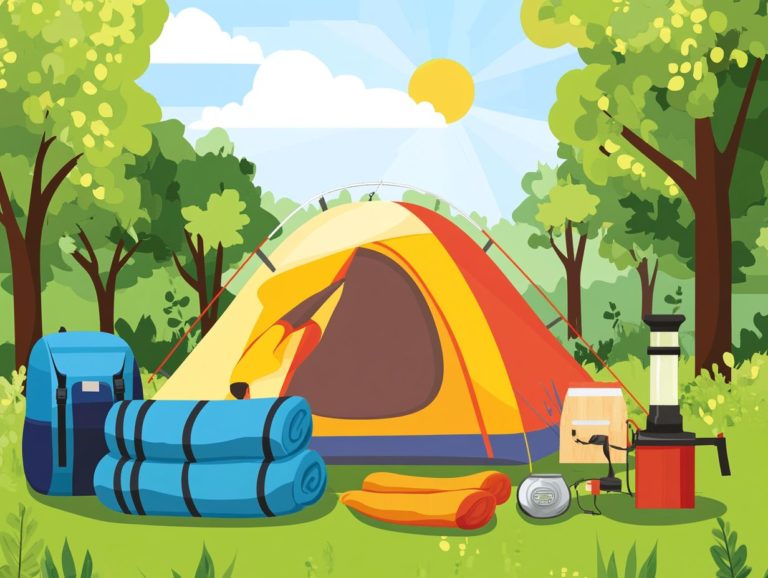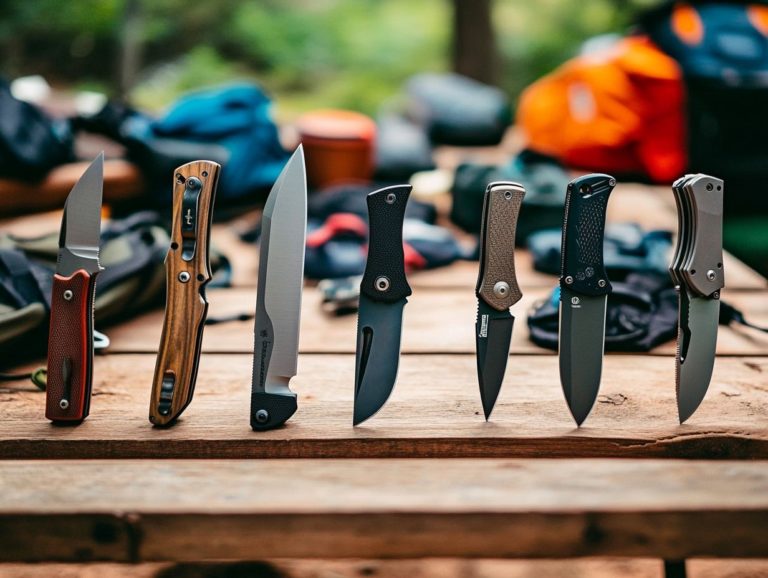Best Camping Gear for Solo Travelers
Embarking on a solo camping adventure is a journey filled with both exhilaration and a touch of trepidation. To truly elevate your experience, equipping yourself with the right gear is paramount. This guide delves into the essential camping items tailored specifically for solo travelers, ranging from lightweight tents to innovative portable cooking solutions.
You ll also find invaluable safety tips, strategic planning advice, and key pitfalls to avoid, empowering you to embark on your journey with unwavering confidence. Get ready to discover thrilling secrets that will enhance your solo camping escapade!
Contents
- Key Takeaways:
- 1. Lightweight and Compact Tent
- 2. Sleeping Bag and Sleeping Pad
- 3. Portable Stove and Cookware
- 4. Water Filtration System
- 5. Multi-Functional Backpack
- 6. Headlamp or Flashlight
- 7. Portable Power Bank
- 8. First Aid Kit
- 9. Navigation Tools
- 10. Multi-Purpose Knife
- 12. Lightweight and Quick-Drying Clothing
- 12. Insulated Water Bottle
- 13. Portable Hammock
- 14. Insect Repellent
- 15. Emergency Shelter
- What Are the Benefits of Solo Camping?
- Frequently Asked Questions
- What are the essential items to pack in my camping gear for solo travel?
- What type of tent is best for solo travelers?
- Is a camping stove necessary for solo travel?
- What are some must-have items for safety when camping alone?
- What are some tips for packing light when camping solo?
- How can I ensure I have a comfortable and enjoyable solo camping trip?
Key Takeaways:
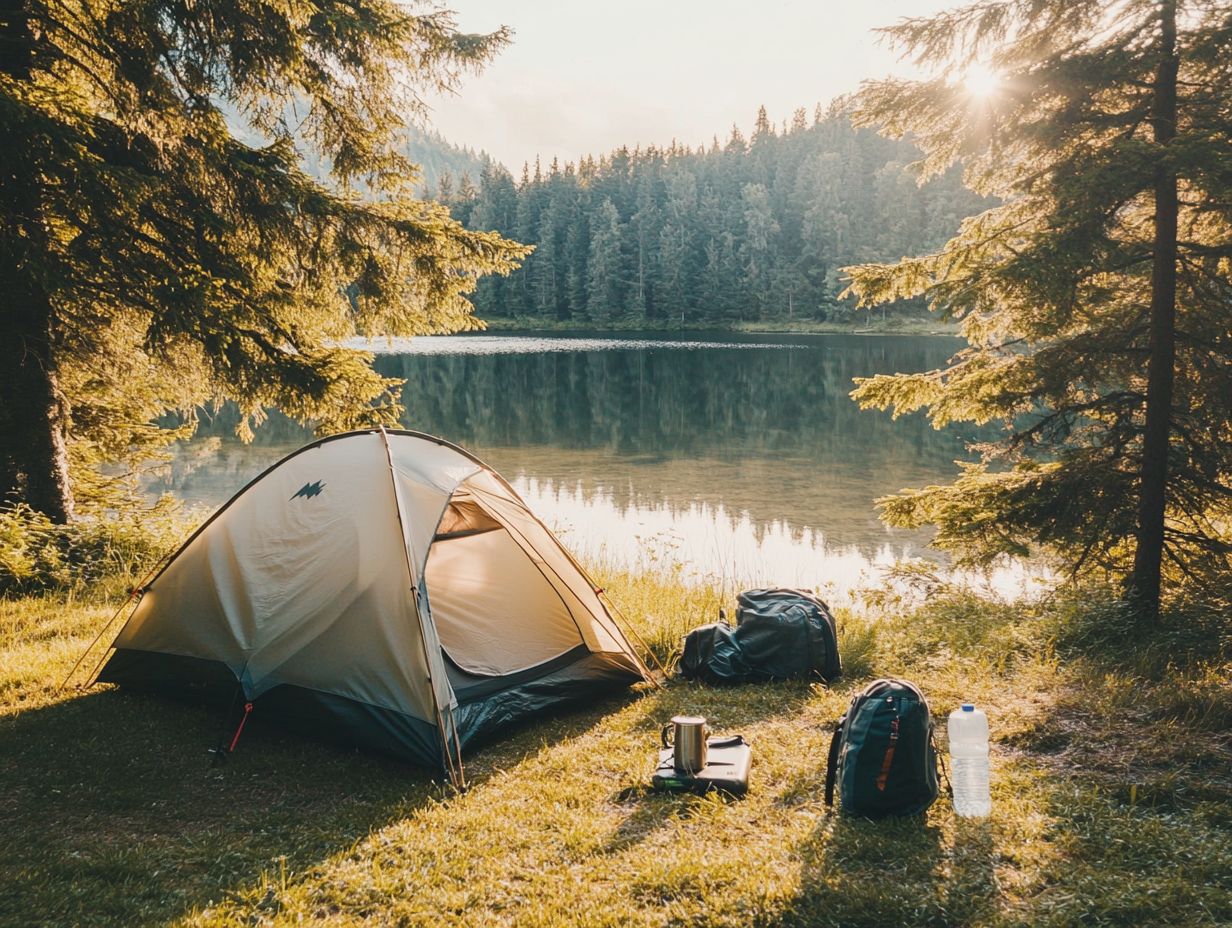
- Invest in lightweight and compact camping gear to make solo camping easier and more manageable.
- Remember to pack essentials like a sleeping bag, portable stove, and water filtration system to ensure comfort and sustainability on the trip.
- Stay safe and prepared by packing a first aid kit, navigation tools, and a multi-purpose knife while also considering potential hazards and planning accordingly.
1. Lightweight and Compact Tent
A lightweight and compact tent is an absolute must-have for your outdoor adventures, particularly when you’re heading into the breathtaking Canadian Rockies or setting off to explore backcountry camping sites. Here, every ounce matters, and having the right camping supplies ensures your comfort and mobility.
When selecting a tent for solo journeys, consider weight, durability, and weather resistance. These factors are crucial for keeping you protected in ever-changing climates. Choosing the right model can truly elevate your camping experience. A tent that sets up easily allows you to immerse yourself in nature rather than struggle with complicated gear.
Brands like MSR Hubba and North Face provide outstanding options. The MSR Hubba NX is a versatile choice for mixed terrains, while the North Face Stormbreak stands out for its reliable shelter across varied conditions. Each of these tents strikes a perfect balance between portability and sturdiness, making them ideal companions for anyone eager to embrace the great outdoors.
2. Sleeping Bag and Sleeping Pad
A high-quality sleeping bag, paired with a comfortable camping pillow, can elevate your camping experience, granting you warmth and a restful night s sleep even in the brisk backcountry.
When it s time to choose a sleeping bag, think about the climate you’ll be camping in. For colder regions, a bag with down or synthetic insulation is your best bet, as it effectively traps heat while remaining lightweight. Brands like Patagonia strike a perfect balance between warmth and packability, making them excellent choices for trekking adventures.
If you’re heading into milder climates, a lightweight summer bag may do the trick without weighing you down. Don’t overlook the importance of a sleeping pad; it acts as a vital barrier against the cold ground, providing both insulation and cushioning.
Look to models from Sea to Summit, renowned for their compact design and impressive R-value (a measure of thermal resistance), ensuring your setup fits neatly into your backpack while keeping you cozy throughout the night.
3. Portable Stove and Cookware
Having a reliable camp stove and quality cookware is essential for your outdoor cooking endeavors, allowing you to whip up warm meals and savor delightful culinary experiences even in the most remote locations.
As an adventure enthusiast, you often find yourself contemplating the merits of various camp stoves. Take the versatile Jetboil, for example, renowned for its speed and efficiency, versus the innovative BioLite, which cleverly utilizes wood for fuel, providing a sustainable cooking solution. Each option boasts unique benefits, making meal preparation feel effortless.
Equipping yourself with essential cooking utensils think durable spatulas, collapsible serving dishes, and lightweight pots can elevate your culinary experience. By prioritizing efficient meal prep, you not only simplify the cooking process but also enhance the enjoyment of communal meals with friends or fellow campers.
Don t overlook the importance of easy-to-pack snacks, like energy bars and dried fruit, which can be lifesavers on the trail. Incorporating proper food storage solutions, such as bear canisters, ensures your provisions remain fresh and safe while you explore the great outdoors.
Start packing your gear today and embrace the adventure waiting for you!
4. Water Filtration System
A proper water treatment system is essential for your camping safety. It ensures you have access to clean drinking water during your outdoor adventures in the wilderness.
As an outdoor enthusiast, you’ll often rely on natural water sources. Understand the various filtration options available. Portable filters, like those found in Nalgene bottles, offer convenience and efficiency, allowing you to refill on the go without compromising your safety.
Meanwhile, purification tablets serve as a lightweight alternative. They effectively neutralize harmful pathogens in contaminated water. Staying hydrated is vital; dehydration can lead to fatigue and diminish your performance on the trail.
Untreated water from lakes and streams can harbor harmful bacteria and parasites, posing serious health risks. Therefore, investing in a reliable filtration system is not just a luxury; it s a necessity for any intrepid explorer like you.
5. Multi-Functional Backpack
A multi-functional backpack is an essential piece of camping gear. It provides ample storage and organization for all your crucial supplies, setting you up for a successful outdoor adventure, along with your hiking gear.
With thoughtfully designed compartments, this versatile pack keeps your camping hygiene products and survival gear secure. It also ensures easy access to lightweight essentials when every second counts. Imagine pockets specifically for hydration sleeves, first-aid kits, and organized spaces for your tools and utensils everything is right where it should be.
Brands like Arcteryx and VSSL have earned their stripes with quality options. They deliver durable, weather-resistant materials that can withstand the toughest outdoor conditions. Investing in one of these backpacks means you re ready to embrace adventure, knowing that everything you need is neatly packed and primed for any situation.
6. Headlamp or Flashlight
A reliable headlamp or flashlight is essential for navigating the campsite at night. It offers you safety and convenience as you set up your tent or prepare your cooking system in the dark.
Selecting the perfect light source is vital. Brightness levels, typically measured in lumens (a unit that measures the total amount of visible light emitted), determine how far and wide the beam will reach. This is a key factor for tasks like night hiking or ensuring visibility during emergencies.
Battery life is key. A long-lasting battery means fewer interruptions, allowing you to stay focused on your adventure without the hassle of constant recharges. Weight also plays a significant role in comfort, especially if you’re trekking with your gear over long distances.
If you re looking for recommendations, the Petzl Actik Core stands out for its excellent balance of brightness, versatility, and lightweight design. On the other hand, the Fenix PD35 is an outstanding choice for those requiring a robust flashlight for emergency kits.
7. Portable Power Bank
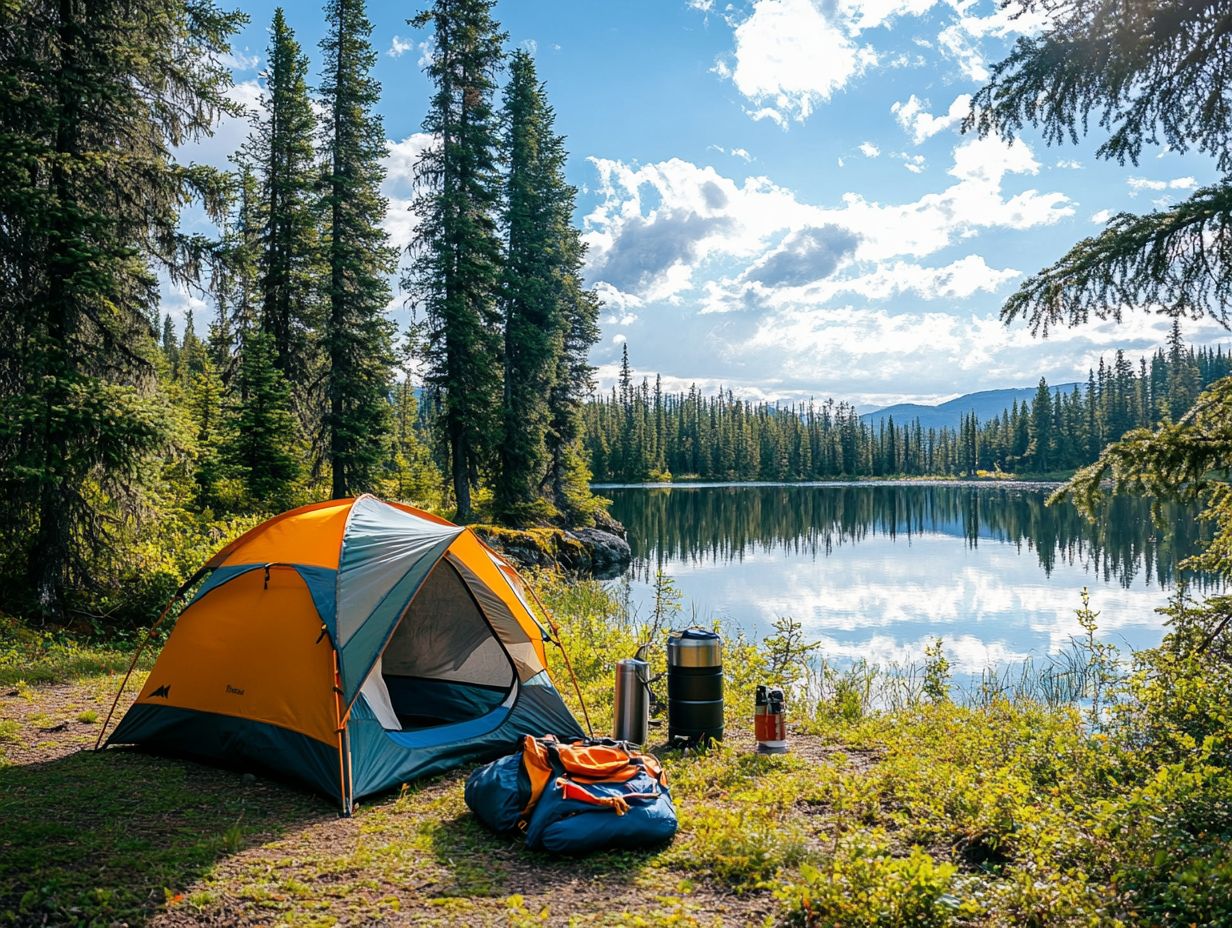
A portable power bank is essential for every camper. It ensures that your vital devices stay charged throughout your outdoor adventures from navigation tools to communication devices and is crucial for maintaining your camping technology.
For many outdoor enthusiasts, having a reliable power source enhances safety and provides peace of mind in the wilderness. Don t miss out on the comfort of staying connected!
When selecting a power bank, consider its capacity, as this directly impacts how many times it can recharge your devices. Durability is also crucial opt for models designed to withstand harsh weather conditions, including water and dust resistance.
These features guarantee that your power bank will perform reliably. This allows you to remain in touch and aware, no matter what nature decides to throw your way.
8. First Aid Kit
Your outdoor adventures await, so gear up with a kit that s ready for anything! Equipping yourself with a comprehensive first aid kit is essential for camping safety. It ensures you’re prepared for minor injuries and emergencies as you embark on your outdoor adventures, keeping in mind potential hazards and survival skills.
It s crucial to make this kit your own according to your specific needs and the activities you have planned. If you re setting out on a hiking journey, don t overlook items like:
- blister pads
- sunscreen
- bug spray
These can be lifesavers. If backcountry camping is on your itinerary, it makes sense to expand your collection of supplies to include:
- a splint
- antiseptic wipes
- emergency space blankets
Think about any personal medications or allergies. Making sure your kit is tailored to address potential emergencies unique to your group or location can make all the difference in ensuring a safe and enjoyable trip.
Effective navigation tools are essential for your outdoor camping adventures, enabling you to explore the wilderness with confidence while ensuring compliance with camping permits and regulations.
Whether you lean toward the classic charm of detailed maps and a compass or prefer the modern convenience of GPS devices like Garmin, each tool plays a distinct role in enhancing your camping experience. The right combination of these tools not only helps you determine your location but also enables you to plot routes, identify nearby points of interest, and steer clear of potential hazards.
Mastering how to read a topographic map which shows elevation and terrain features, helping you navigate hilly areas or calibrate a compass can equip you with invaluable skills, particularly if you find yourself venturing off the beaten path. Familiarizing yourself with the features of GPS devices can save you precious time and allow you to navigate effortlessly, no matter the terrain.
10. Multi-Purpose Knife
A multi-purpose knife is a very useful item to have in your camping gear, offering an impressive range of functionalities, from food preparation to handling emergency situations in the wilderness.
With features like a can opener, screwdriver, and even a mini-saw, this tool becomes essential for both novice campers and seasoned adventurers alike. When you re on the hunt for such versatility, brands like Gerber truly stand out for their durability and reliability, ensuring you have a dependable companion by your side.
But beyond practicality, it s vital to prioritize safety when using a multi-purpose knife. Don t head into the wild without this must-have tool at your side! Always store it securely and handle it with care. Regular maintenance is key to keeping the blade sharp and functional, so you can seamlessly slice tomatoes or tackle unexpected repairs in the wild.
12. Lightweight and Quick-Drying Clothing
Choosing lightweight and quick-drying clothing, like hiking shorts and insulated jackets, is crucial for keeping you comfortable and adaptable during your outdoor adventures.
These versatile options make layering a breeze, which is essential when you’re navigating the unpredictable weather of the great outdoors. By pairing a moisture-wicking base layer with a breathable mid-layer, you can effectively regulate your body temperature and enhance your overall comfort. Fabrics such as merino wool and synthetic blends serve as excellent choices for base layers, as they wick moisture away while providing insulation without the bulk.
Brands like Patagonia and REI are your go-tos for high-quality camping apparel, specifically designed to withstand a variety of climates while ensuring optimal performance. Stay comfortable and ready for anything by choosing the right layers your adventure starts with the right gear!
12. Insulated Water Bottle
Staying hydrated on the move is essential. An insulated water bottle keeps your drinks at the perfect temperature while reducing waste.
When choosing your bottle, think about the size. A compact bottle fits easily in your backpack, while a larger one is great for longer adventures.
The material is important too. Stainless steel is durable and great for keeping your water cool during hikes.
With advanced insulation, you can enjoy icy drinks on hot days and warm beverages at night. This improves your experience and boosts your performance on camping trips.
13. Portable Hammock
A portable hammock can significantly elevate your camping experience. It offers you a cozy spot to unwind and immerse yourself in the tranquil beauty of nature.
These versatile retreats set up in minutes, allowing you to relax without the burden of bulky furniture. Many outdoor enthusiasts admire the lightweight design of hammocks, making them ideal for backpacking trips.
Brands like ENO and Hennessy provide durable options that withstand various weather conditions, maximizing your investment.
For hanging your hammock, select sturdy trees with ample space. Secure it at about hip height to prevent strain on the fabric and ensure your safety.
14. Insect Repellent
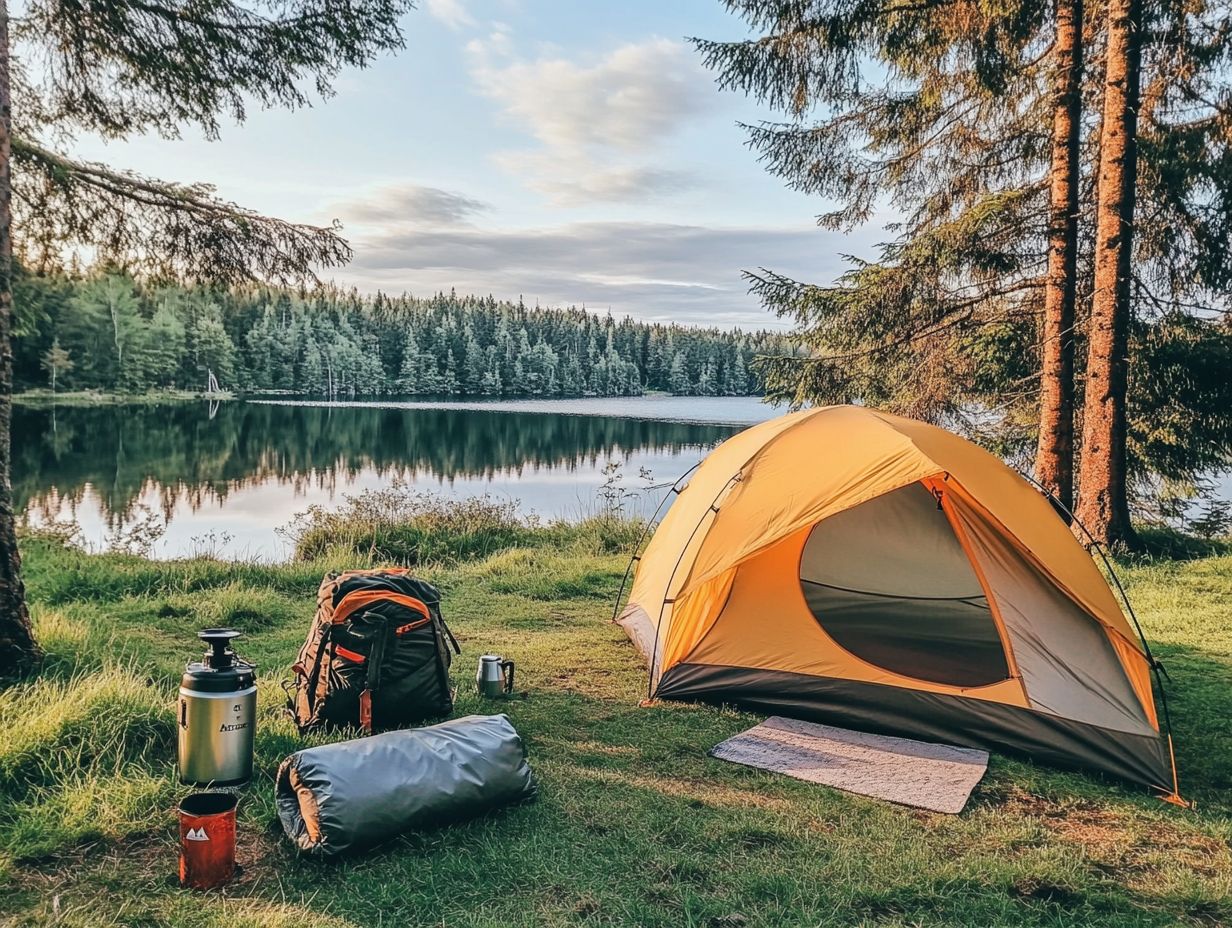
Insect repellent is essential for your camping checklist. It protects you from pesky bites and stings that can interrupt your outdoor enjoyment.
You’ll find a variety of repellents, including those with DEET, picaridin, natural oils like citronella, and even electronic devices that emit ultrasonic sounds.
Each type has varying effectiveness based on your environment and specific pests. For optimal results, apply these products following the manufacturer’s instructions for thorough coverage.
Wear long sleeves and use netted headgear. Set up your camp away from stagnant water to boost your defenses against bothersome insects. Enjoy a bite-free adventure by taking these steps now!
15. Emergency Shelter
An emergency shelter is an essential aspect of your camping safety. It provides crucial protection against unexpected weather changes.
From tarp structures to bivy sacks (small tents that keep you dry) and inflatable tents, a range of shelters exists to suit your needs.
When choosing one, think about your camping style whether you enjoy lightweight backpacking or prefer the comforts of car camping.
Master key survival skills, like setting up these shelters effectively in inclement weather. Learning how to secure them against wind can ensure a safe refuge.
Understanding the materials and designs will help you make informed decisions, boosting your confidence as you venture into the great outdoors.
What Are the Benefits of Solo Camping?
Solo camping offers many exciting benefits. It provides a chance for personal introspection and enhances survival skills.
By immersing yourself in the serene solitude of the wilderness, you’ll experience a significant reduction in stress levels. This allows your mind to wander freely and recharge.
This experience boosts your self-reliance and builds confidence in your skills as you learn to navigate challenges on your own. You also gain the opportunity to explore your personal preferences in gear and camping locations.
Whether you’re choosing the perfect tent or scouting the ideal secluded spot by a shimmering lake, this trial-and-error process enhances your connection to the environment.
Ultimately, solo camping can be a transformative journey that nurtures your mental well-being and fosters individual growth.
How Can One Stay Safe While Camping Alone?
Staying safe while camping alone requires careful preparation, awareness of backcountry safety (safety practices in remote wilderness areas), and practical survival skills to ensure an enriching outdoor adventure.
Share your plans with a friend or family member. Detail where you intend to go and when you expect to return. This way, someone knows your itinerary should an emergency arise.
Understanding your personal limits is crucial. Select a campsite that aligns with your experience and physical abilities to mitigate the risk of accidents.
Equip yourself with essential safety gear, like a well-stocked first aid kit and reliable navigation tools. These proactive steps allow you to enjoy a more pleasant wilderness experience.
What Are Some Essential Tips for Solo Camping?
Essential tips for your solo camping adventure include careful planning, a reliable camping checklist, and a keen understanding of your preferences for a seamless outdoor experience.
Selecting the right gear is paramount. Opting for lightweight equipment reduces the burden of carrying it solo. Ensuring warmth and protection from the elements enhances your safety.
When scouting for campsites, seek out flat terrain and steer clear of water sources to minimize risks from flooding or wildlife encounters.
Maintaining hygiene is vital for a comfortable journey. Use biodegradable soap and practice proper waste disposal to protect the environment and keep yourself fresh and healthy.
How Can One Plan a Successful Solo Camping Trip?
To plan a successful solo camping trip, do thorough research, secure the necessary permits, and tailor your experience to fit your preferences and skills.
Start by choosing a destination that matches your skill level and desired challenge. After pinpointing the perfect location, create a detailed packing list to ensure you don t overlook essentials, from gear to food supplies.
Familiarizing yourself with the terrain helps you avoid unexpected surprises, while understanding local regulations significantly enhances your overall experience.
This level of preparation instills confidence and enriches your solo adventures, allowing for a deeper connection with the great outdoors.
Ready to explore the wilderness on your own? Start planning your solo camping adventure today!
What Are Some Common Mistakes to Avoid While Solo Camping?
Common mistakes to avoid while solo camping include overpacking, neglecting safety precautions, and failing to thoroughly research your camping area. These oversights can significantly detract from your overall experience.
Many adventurers underestimate the importance of selecting the right gear, particularly a tent that balances lightweight portability with weather resistance. Familiarizing yourself with the terrain is essential; you wouldn’t want to set up camp in areas prone to flooding or unexpected wildlife encounters. To enhance your camping experience, consider the best lightweight camping gear for backpackers that suits your needs.
Managing your expectations is crucial. As a solo camper, preparing for solitude and planning activities will keep you engaged and content during your trip. By taking these proactive steps, you can elevate your camping adventure and sidestep the common pitfalls that may arise.
Frequently Asked Questions
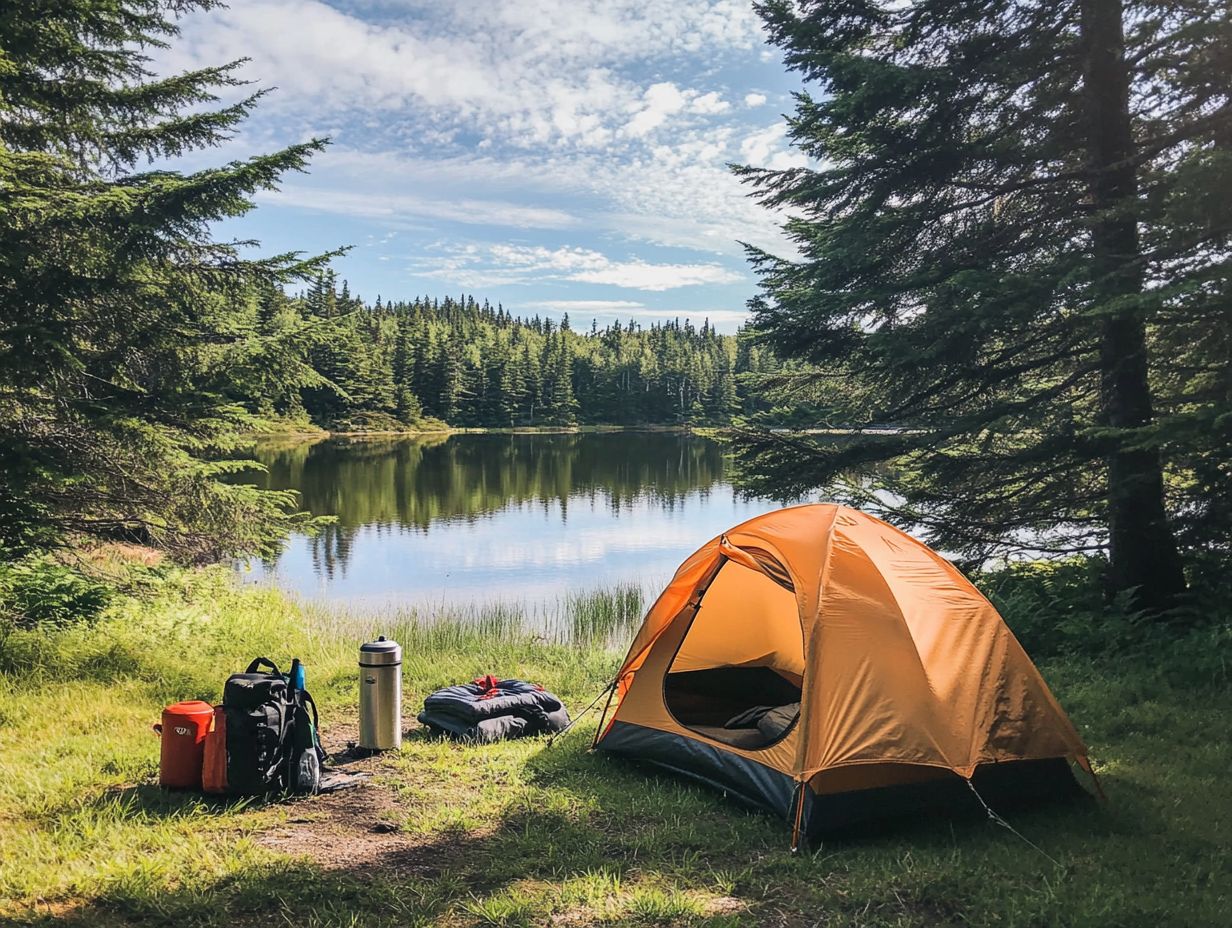
What are the essential items to pack in my camping gear for solo travel?
- A tent
- A sleeping bag
- A camping stove
- A water filter
- A first aid kit
- A tool that can be used for various tasks
These items will help you stay safe and comfortable during your trip.
What type of tent is best for solo travelers?
A lightweight and easy-to-set-up tent is best for solo travelers. Look for a tent with a single pole design for quick and effortless setup, and ensure it is suitable for the weather conditions of your destination.
Is a camping stove necessary for solo travel?
A camping stove is highly recommended for solo travelers as it allows you to cook your own meals and enjoy hot food and drinks while on your trip. Opt for a compact and lightweight stove that is easy to carry and use.
What are some must-have items for safety when camping alone?
- A first aid kit
- A personal locator beacon
- A whistle or signaling device
- A headlamp
It is also important to let someone know your itinerary and expected return time before embarking on your trip.
What are some tips for packing light when camping solo?
To pack light when camping solo, opt for multi-purpose items such as a tent that can also be used as a rain shelter or a sleeping bag that can be converted into a blanket. Plan your meals ahead and bring only the necessary amount of food and water. Choose lightweight and compact alternatives for items like a camping stove and utensils.
How can I ensure I have a comfortable and enjoyable solo camping trip?
To ensure a comfortable and enjoyable solo camping trip, have a well-planned itinerary and all the necessary items for safety and comfort. Research your destination beforehand and pack accordingly. Don’t forget to bring entertainment, like a book or a portable speaker, to keep yourself engaged during downtime.
Don’t miss out on these essential tips! Share your camping experiences or questions in the comments below.

